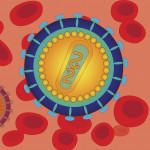Would you prefer a quick or slow death? Many incarcerated Russians living with HIV feel that’s the choice they face when deciding whether to remain in prison or serve in Russia’s war against Ukraine, reports The New York Times.
Incarcerated Russians with HIV say they don’t have access to lifesaving treatment—or at least to meds they think actually work, which means they’d eventually die of AIDS-related illness in prison, or a “slow death.”
Conversely, if they volunteer to serve in the war in exchange for a pardon and effective HIV meds, they’d likely meet a “sudden death” on the battlefield, as one soldier explained it. Such volunteers are often ordered to engage in risky combat with little training.
About 10% of Russia’s prison population is HIV positive, according to the New York Times. Hepatitis C and tuberculosis are also prevalent among the incarcerated. About 50,000 prisoners have volunteered for the Russian forces since last summer, accounting for about 10% of the country’s incarcerated population.
Ukrainian military experts have reported capturing Russian soldiers living with HIV and hepatitis C. Such soldiers are easily identified by the color-coded wristbands they’re made to wear (white for hepatitis C, red for HIV) to alert fellow soldiers of their status in the event that they are wounded and pose a potential health risk.
Russia invaded Ukraine in February 2022, with Russian President Vladimir Putin recruiting hundreds of thousands of male citizens against their will. According to previous reporting, to avoid the draft, citizens have resorted to breaking their own limbs and purchasing fake diagnoses for HIV and hepatitis C, though now it seems a diagnosis wouldn’t necessarily disqualify one from service.
In the United States, people living with HIV and hepatitis C are not allowed to enlist in the military; last fall, some members of Congress pressured the Biden administration and the Department of Defense to allow those with HIV and hep C to serve.
In addition, a federal judge last spring struck down Pentagon policies that discharged and denied promotions to service members who contracted HIV.







Comments
Comments